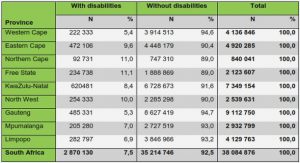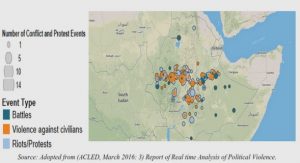Get Complete Project Material File(s) Now! »
Clustering of Farms Within Each Sector
Accumulation of long-term data on a fixed number of farms can only minimise uncertainty around averages or trends in sustainability indicators at those places – it cannot provide greater confidence about what is happening to all farms in a given sector that follow a given farming system. As expected, we found that variation between individual whole farms within each panel remained large no matter how many years of results were analysed. Part of this variation between farms relates to location, both at regional and local scales. Therefore ARGOS confronted a trade-off between (a) achieving the most powerful test of the null hypothesis by bunching the farms together as much as possible to expunge background regional variation, and (b) spreading the sampling effort over as wide an area as possible to make sure ARGOS results are representative and therefore relevant to farming in that sector for as much of New Zealand as possible10. This latter concern relates to the ‘zone of inference’ that is possible from the ARGOS study11. ARGOS sought the best of both worlds by monitoring orchards and farms that were arranged in ‘clusters’ of closely-spaced farms and where there was a representative of each panel (organic, IM, conventional) within each cluster, but with clusters spread widely throughout our zone of inference.
Trading off Depth and Breadth: Hierarchical and Nested Designs for More Reliable Inference
Limited funds and team capacity necessitated trade-offs between studying a few agricultural systems processes in considerable depth compared to examining more processes relatively superficially; and between studying fewer farms in considerable depth compared to more farms relatively superficially. Strident debate between the disciplinary teams on this trade-off reflected our different scholarly traditions, but also a general reductionist presumption in all disciplines that detailed study of the parts of a system can be re-joined back together to reconstruct a whole system. The result was a marbled, inter-layered and somewhat uneven treatment of the depth of inquiry for different components of the system. Overall, we sought to maximise reliability and the zone of inference by closely crosslinking deeper investigations with broader but shallower methods.
Programme Management Committee (PMC)
The PMC was responsible for the overall management of the ARGOS Programme. The PMC comprises four people including, the chair of the Academic Research Committee, the Programme Leader, a Programme Design and Development Specialist and the Programme Manager. The PMC, before the Programme Leader and Manager were appointed, initiated the original FRST bid, developed the research design and established rapport with key end users. It appointed the objective leaders, the Programme Manager and other key staff. Initially the PMC met on a monthly basis to discuss financial and operational management of the programme and make decisions on funding, budgets, human resource management and issues that affect the overall management and running of ARGOS.
Farm Management
The lead objective in ARGOS (Objective 1) was titled ‘Farm Management’. This objective provided administrative and research services, and spearheaded establishment and nurturing of relationships with key stakeholders. Objective 1 employed the ARGOS Field Officers and administratively organised the whole research programme. This acted as the key site of political liaison with farmers and industry groups. At the same time, Objective 1 also used its Field Officers to administer an annual ‘Management Survey’. This survey both enabled a sequential collection of relevant on-farm production (and other) data, but also became the vehicle by which other objectives could ask questions to farmers about aspects of farm management. Hence, in Survey 2 a section was included on farm energy. In the next survey the Environment Objective asked questions about Weeds and Weed Management. In another survey, the Economic Objective asked questions about off-farm economic connections and social capital. Due to the non-expert nature of the delivery of this set of surveys, this instrument became the vehicle to ask relatively straightforward ‘Yes/No’ questions of ARGOS farmers.
He Whenua Whakatipu: Case Studies in Sustainable Agriculture of Māori
The second objective within ARGOS was termed He Whenua Whakatipu, which translates loosely as ‘making the land grow.’ The He Whenua Whakatipu objective was established to identify the key ingredients for the sustainable development of Māori owned land (Reid, 2005). It is estimated that over 40% of Māori land is not utilised to fulfil the development aspirations of its owners. Some of this land consists of small dispersed blocks that may be landlocked, marginal, or even abandoned by owners, and therefore unsuitable for development. However, a significant area of unutilised Māori land does have good development potential, yet is not being developed or utilized. For example in Te Waipounamu, the South Island of New Zealand, there are 13,341 hectares of high production grass land in Māori ownership of which less than 2000 hectares is developed or utilized by its owners (Reid, 2008).
Contents :
- EXECUTIVE SUMMARY
- CONTENTS
- ACKNOWLEDGEMENTS
- INTRODUCTION
- A Sustainability Crisis in World Agriculture
- The Importance of Agricultural Sustainability for New Zealand
- The ARGOS Programme and its Goals
- The Historical Context for a New Zealand Agricultural Sustainability Study
- The Aims of this Working Paper
- THE FORMATION OF THE ARGOS GROUP
- THE DESIGN OF THE ARGOS PROJECT
- The main ARGOS null hypothesis
- A Sustainability Crisis in World Agriculture
- Choice of New Zealand Agricultural Production Sectors for Study
- Establishing the ARGOS research panels
- The Need for a Systems and Transdisciplinary Approach
- Replication at the Whole Farm Level
- A Thirty-year Longitudinal Study
- Clustering of Farms Within Each Sector
- Before-After-Control-Impact Study Design
- Measuring a Wide Variety of Co-variates to Better Test Farming System Differences
- Standardisation of Methods, Quantification and Triangulation
- Trading off Depth and Breadth: Hierarchical and Nested Designs for More Reliable Inference
- ARGOS TEAM MANAGEMENT
- Programme Management Committee (PMC)
- Academic Research Committee (ARC)
- DISCIPLINARY APPROACHES TO SUSTAINABILITY
- Farm Management
- He Whenua Whakatipu: Case Studies in Sustainable Agriculture of Māori
- Environment Objective
- Economic Objective
- Methods for economic research
- Key Topics for Economic Research
- Social Objective
- Methods for social research:
- Key Topics for Social Research
- TRANSDISCIPLINARY RESEARCH THEMES
- Resilience thinking
- Market Quality Assurance Pathways to Sustainability
- Agricultural Intensification
- A capitals approach to sustainability assessment
- Māori approaches to sustainable farming
- GENERAL DISCUSSION
- Strengths and Weaknesses of ARGOS Design
- Representativeness and ARGOS’s zone of inference
- Is ARGOS’s statistical power adequate and inferences reliable?
- Different disciplinary approaches to clustering of study plots
- Issues arising from structuring the design around a null hypothesis
- Future opportunities and challenges for ARGOS
- Research process challenges arising from a 30-year longitudinal design
- Understanding Causation to Advise on Transitions to More Sustainable Agriculture
- Experiments to test causation and improve models
- A shift to more predictive modelling
- A need for increased investment in dairy research
- Potential addition of a dairy conversion study
- Transdisciplinarity: a challenging but eventually rewarding research process
- CONCLUSION: THE FUTURE VALUE OF ARGOS
- REFERENCES
- APPENDIX 1: ARGOS PUBLICATIONS TO AUGUST
- APPENDIX 2: GANT CHART OF ARGOS’S MAIN SAMPLING RHYTHMS
GET THE COMPLETE PROJECT
The Agriculture Research Group On Sustainability Programme: A Longitudinal and Transdisciplinary Study of Agricultural Sustainability in New Zealand






